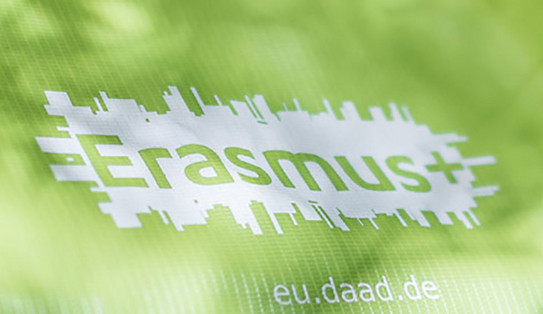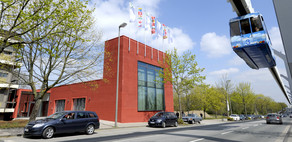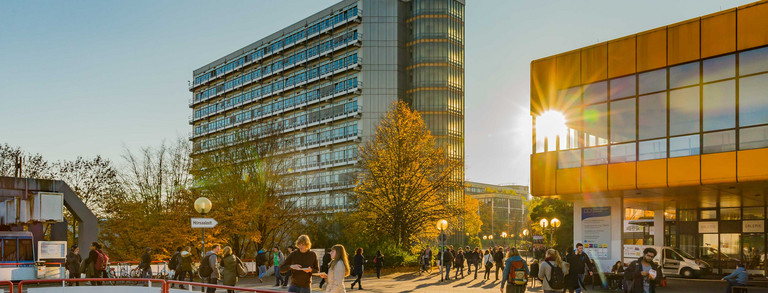Students with Special Needs or Chronic Illness
TU Dortmund University is very active in creating equal opportunity study conditions for students with special needs and/or chronic illnesses. You can also receive more support for your stay abroad than you might think. In select scholarship programs, lump sums can be awarded for additional costs incurred abroad or you may even apply for funding to cover your real costs and even preparatory trips.




Erasmus+ Inclusion Top Up | Real Cost Application | Preparatory Trips

The new program generation of Erasmus+ is now even more inclusive and focused on creating equal opportunities. With its new forms of mobility, additional funding opportunities and broader target audience, the program makes stays abroad more feasible for even more people by breaking down potential barriers to going abroad.
Students with special needs or chronic illness who go on an Erasmus+ funded stay abroad can also apply for a supplemental grant of 250 EUR per month in addition to the regular Erasmus+ mobility grant (a so-called Inclusion Top Up).
If very high costs are expected during the stay abroad (e.g. costs for assistance, transport of devices or medication, etc.), applications for the expected real costs can also be submitted (instead of the Inclusion Top Up) in advance.
In addition, students with special needs and one accompanying person may also apply for funding for a preparatory trip in order to test the feasibility of a longer stay and make arrangements on site that can not be easily organized from Germany.
Erasmus+ Outgoings with questions about the Inclusion Top Up, the Real Cost Application as well as the Preparatory Trip Application can contact
- Hella Koschinski (studies)
- Laura Hope (internships)
The additional funding opportunities apply in particular to students with
- physical disability,
- visual impairment/blindness,
- hearing impairment/deafness,
- speech impediment,
- chronic illness
Target group: Erasmus+ participants with a GdB of 20 or more or a proven disability that results in additional financial needs. In case of chronic illness, the illness must lead to additional financial needs abroad.
Erasmus+ Studies:
- Inclusion Top Up: You will receive a separate email after you have been accepted into the Erasmus+ program Honorary Declaration Form (Ehrenwörtliche Erklärung). In this email you will find important informationen about social topups and the Honory Declaration as an attachment.
- Real Cost Application and/or Preparatory Trip Application: Contact Hella Koschinski as soon as possible after submitting your Online Acceptance Form. She has the current DAAD application template at hand and can advise you accordingly. The application must be sent to the DAAD via the International Office at least three months before the start of the mobility.
- Inclusion Top Up: When you apply for the Erasmus+ grant be sure to mark the appropriate box on the application form and upload your Honorary Declaration Form (Ehrenwörtliche Erklärung). The template is available in the application materials. However, due to limited resources we recommend applying as early as possible!
- Real Cost Application and/or Preparatory Trip Application: Contact going-abroadtu-dortmundde as soon as possible after submitting your regular Erasmus+ application. You will then receive the current DAAD application template and assistance with it. The application must be sent to the DAAD via the International Office at least three months before the start of the mobility.
The DoBuS team can also help with the planning and organization for the application - let us advise you! Since you will need proof of the difference between the costs at home and abroad, please plan enough time for the application.
The handicap identity card, the notice from the state social welfare office or a letter from your doctor is considered as proof to apply for additional funding.
In the case of chronic illness, the letter from your doctor must indicate that the illness will cause expected additional expenses abroad.
Please note that you must keep all receipts for the social top ups, as the university will carry out random checks.
PROMOS Scholarship Program
Within the framework of the programs funded through PROMOS, universities can apply for additional funding of up to 10,000 EUR (including expenses for an accompanying person) for a period of up to six months. The prerequisite is that the additional expenses are above and beyond those expenses in Germany and that no other sponsors will provide support. In addition, proof of a degree of disability of at least 50 must be submitted.
For more information, please contact the International Office. Please note that the application takes a lot of time and should therefore be started early (at least 6 months in advance)!
Information Sources
DoBuS
The section "Disability and Studies" (DoBuS) supports the creation of conditions for equal opportunity studies for students with special needs and illness. In particular, the team can assist with Erasmus+ and PROMOS real cost applications.
Tips from the BMBF | DAAD
Studying and working abroad with special needs: tips and testimonials (in German)
Inclusive Mobility
A European platform where universities can register to share their support services related to exchange students with disabilities or chronic illness.
Ministry of Labor, Health and Social Affairs of North Rhine-Westphalia (MAGS)
Your city officials may be able to issue you a disability certificate in other languages for a stay abroad (in German).
Information about the EU Disability Card and EU Parking Card
Wheelchair Travel
Tips and newsletter for traveling in a wheelchair

Contact
E-mail Inquiries
General inquiries: going-abroad @tu-dortmund.de
Erasmus+ study abroad: erasmus-outgoings @tu-dortmund.de
Office Hours
(Only) Erasmus+ Study Abroad:
Office hours via telephone/zoom with Hella Koschinski: by prior arrangement
Tel.: 0231 755-6247
Office hours in presence: only with appointment
Tue 9:00-12:00
General Inquiries - Outgoings (Studies/Internships/Short Programs):
Open office hours (no appointment necessary) with Laura Hope via telephone / Zoom
Tel.: 0231 755-4728
Mon 10:00-11:30 und 13:30-15:00
Tue 10:00-11:30 und 13:30-15:00 (no advising the morning of 8.7.)
Do you need to speak to us in person?
Office hours in presence only with an appointment

![Eat & Read [Translate to English:]](/storages/international/r/Bilder/Veranstaltungen/Eat___Read/waffel_plain_buecherturm.jpg)









